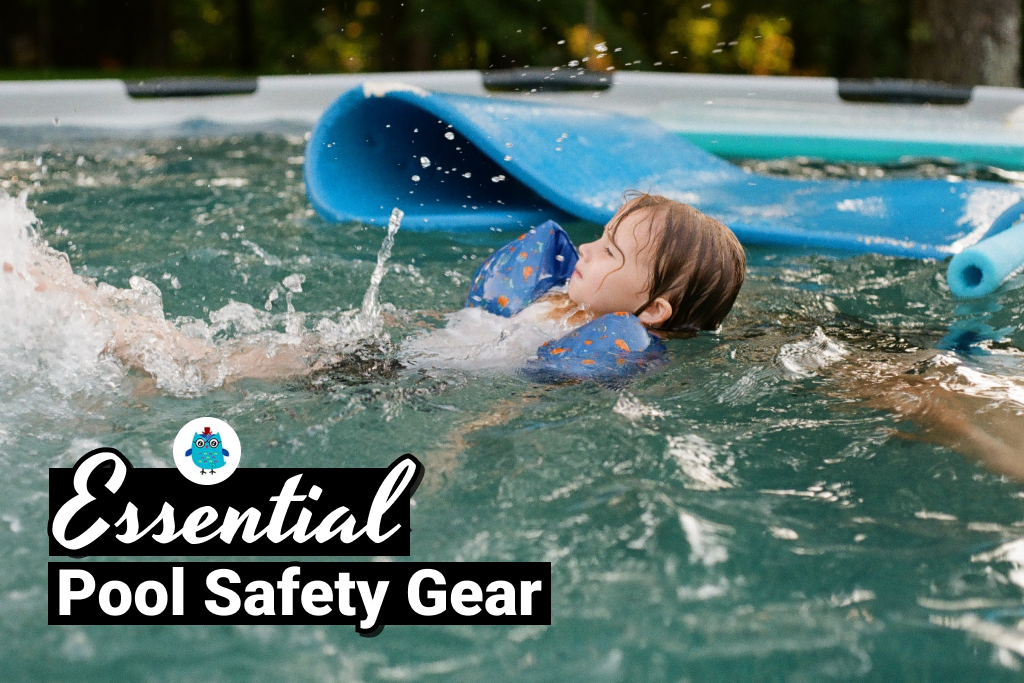Discover the best pool safety devices for toddlers (fences, alarms, flotation aids, and more) with this dad’s guide! Let’s make pool time safe for the whole family!
Let’s face it, pool time can also be a bit nerve-wracking. Did you know that drowning is the leading cause of unintentional death for children ages 1 to 4? That’s a scary statistic, but don’t panic! I’m here to help you navigate the waters of pool safety and find the best devices to keep your little ones safe and sound.
As parents, we can’t afford to take pool safety lightly. Our toddlers are curious and adventurous, sometimes leading to unexpected situations. And because let’s be honest, we can’t have eyes on the back of our heads (though, I’ve tried!), having reliable pool safety devices in place can make all the difference.
This article will explore the wide world of pool safety devices that can give you peace of mind and keep your kiddos safe. From fences and alarms to flotation aids and swim toys, we’ll discuss the ins and outs of each option and help you find the perfect fit for your family’s needs.
So, buckle up, grab your floaties, and let’s dive into the best pool safety devices for toddlers! By the end of this journey, you’ll feel like a pool safety pro, ready to take on the summer with confidence and style.
This article will cover the following safety equipment:
- Pool Fencing and Gates
- Pool Alarms
- Pool Covers
- Personal Flotation Devices
- Swim Aids and Pool Toys
- Pool Safety Education
Uncertain about which pool alarm to get? Take a look at this list of the best pool alarms. I’ve put lots of hours into this pool alarm buying guide so you can find the ideal alarm for your swimming pool safety!
🤗 Transparency Statement: This page may contain affiliate links. If you make a purchase through these links, I may earn a commission at no extra cost to you. Rest assured, I only promote products I trust. Thanks for your support!
Pool Fencing and Gates to Keep Your Kids Safe
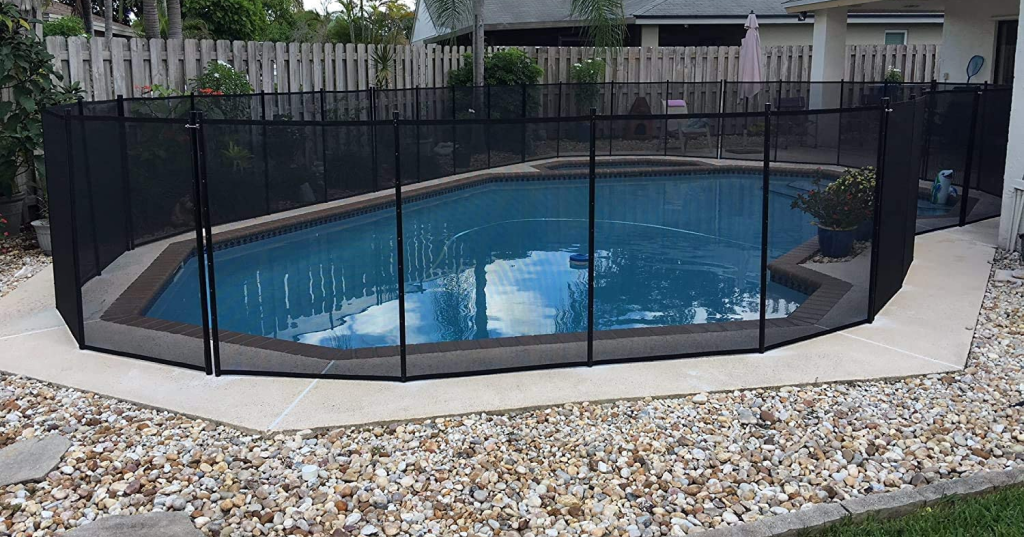
Discover the benefits of pool fencing and gates and how they provide a crucial barrier to keeping your children safe while allowing them to enjoy their aquatic adventures. If you had to install one piece of equipment, I recommend a pool fence.
A Splash of Safety: Types of Pool Fences
There are various types of pool fences, each with its own pros and cons.
- Mesh Pool Fences: These lightweight fences are strong, removable, and see-through. I’ve got this mesh pool fence
 from Amazon, and it’s been a trusty barrier between my little ones and the pool.
from Amazon, and it’s been a trusty barrier between my little ones and the pool. - Metal or Aluminum Pool Fences: Sturdy and durable, these fences offer a more permanent solution. They might be more challenging to remove but they stand the test of time.
- Glass Pool Fences: If you want style and safety combined, glass pool fences are your go-to. They’re sleek and modern and let you watch your kids while they play.
Sure, some of these options are pricey. Whichever type of fence you get is better than no fence at all. Don’t wait for the perfect moment, and secure your pool with the budget you have today.
With that fence, you need one other piece of equipment.
The Magic of Self-Closing and Self-Latching Gates
A gate that closes and latches by itself? Yes, please! This nifty feature adds an extra layer of safety and saves you from the “Did I close the gate?” anxiety. It’s a win-win situation if you ask me. Your pretty fence is only effective if you have a proper latching system.
Installation and Maintenance: The Icing on the Cake
Proper installation and maintenance are key to ensuring your pool fence and gate remain effective. Remember, even the fanciest fence is only useful if installed correctly. Get a professional to install your fence and ensure it meets safety regulations. Remember to inspect your fence and gate regularly for any damage and fix any issues promptly.
Now that we’ve secured the perimeter, let’s dive into another safety measure that will alert you when things go splash – pool alarms!
Pool Alarms for Ultimate Peace of Mind
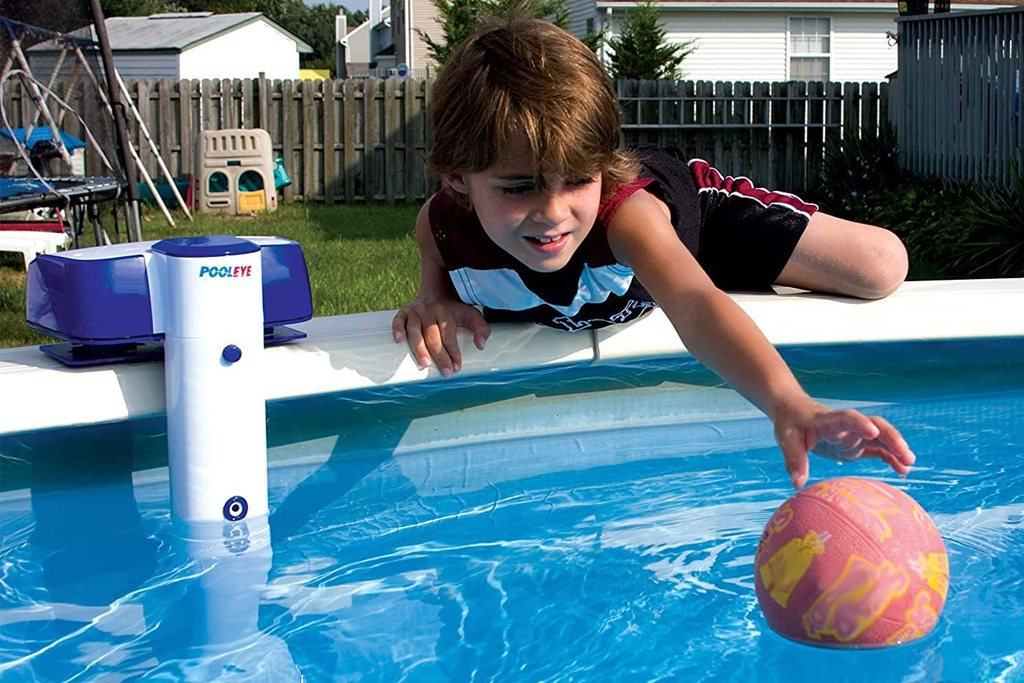
Learn about the various types of pool alarms that help protect your little ones from pool-related accidents and how they give you that extra reassurance regarding their safety.
Door and Window Alarms
These nifty alarms alert you when someone opens the door (from the house) leading to the pool area. They’re perfect for situations where you want to make sure your toddler doesn’t sneak in or out of the pool without you knowing. I’ve got one of these alarms from Amazon on the door leading to the garden, and it’s been a real peace-of-mind booster.
from Amazon on the door leading to the garden, and it’s been a real peace-of-mind booster.
Fence-Mounted Alarms
Fence-mounted alarms detect when someone climbs or breaches the pool fence. If your little one turns into a mini Houdini and tries to scale the fence, you’ll know about it! I have a friend who installed this long-range alarm on his backyard fence , and because of his twins’ climbing skills, I know that it’s been a great addition to his pool safety setup.
, and because of his twins’ climbing skills, I know that it’s been a great addition to his pool safety setup.
Surface Wave Alarms
These alarms monitor the water’s surface and trigger an alert if something disturbs it. They’re helpful when you want to know if your toddler (or even a pet) accidentally falls into the pool. Just remember that surface wave alarms can be sensitive to things like wind or rain, so be prepared for some false alarms!
Subsurface Wave Alarms
Similar to surface wave alarms, subsurface wave alarms detect disturbances in the water, but they work below the surface. They’re less prone to false alarms and can provide more accurate detection of your little one entering the water.
Personal Immersion Alarms
These are “wearable” alarms that go on your toddler’s wrist. They will make a loud sound if they get wet. They’re ideal when you’re worried about your child getting too close to the water or accidentally falling in. Especially when you are in your backyard, gardening, or doing chores that might get your attention away from your child.
For more information on wave alarms & wearables, check out this guide I created on the best pool alarms for kids.
Speaking of being proactive, there’s another device that can help keep your pool area safe and sound: pool covers.
Pool Covers for a Safer Splash Zone
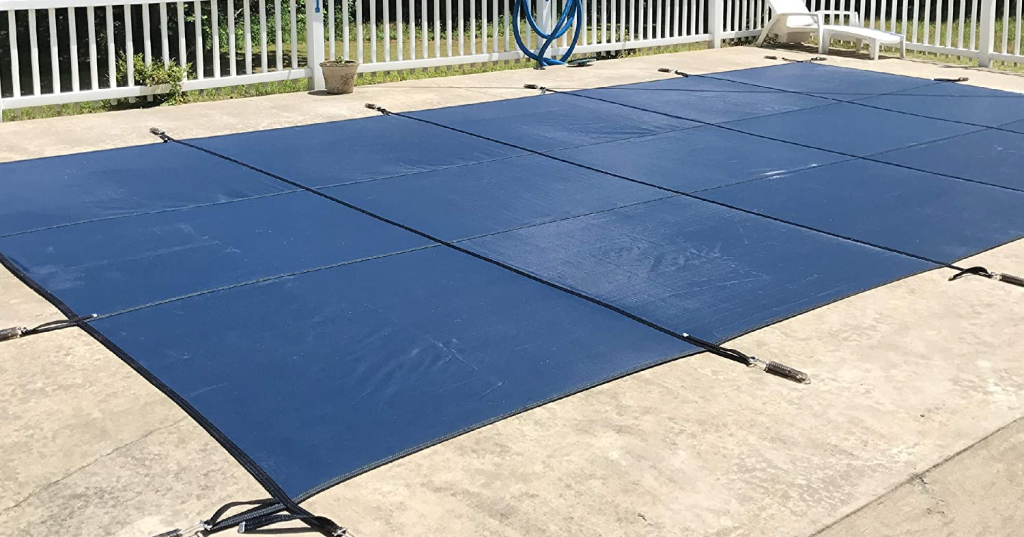
Explore the different types of pool covers. From manual to automatic. And how they keep your pool clean while being an essential layer of safety for your family.
Manual Pool Covers: The Classic Choice
Manual pool covers are the traditional option for covering your pool. They’re usually made of heavy-duty materials like vinyl or mesh and require a bit of elbow grease to put on and take off. Manual covers are great for keeping your pool closed and secure for an extended period, like during winter or when you’re away on vacation. Here is the pool cover that most of my neighbors have installed. Plus, they’re typically more budget-friendly than their automatic counterparts.
that most of my neighbors have installed. Plus, they’re typically more budget-friendly than their automatic counterparts.
Automatic Pool Covers: The High-Tech Solution
If you’re looking for an easy-peasy way to cover your pool, automatic pool covers are the way to go. These bad boys operate with the touch of a button, making them a breeze to use. They’re perfect for situations where you need frequent access to your pool but still want to keep it covered when not in use. Just remember that they can be more expensive than manual covers. Still, for some parents (myself included), the convenience is worth the extra cost.
Safety Pool Nets: Lightweight and Effective
Safety pool nets are a lighter alternative to traditional pool covers. They’re designed to create a barrier preventing toddlers from falling into the pool while allowing water to pass through. These nets are ideal when you want a safety measure in place but only need to cover part of the pool surface. I’ve seen them work wonders for friends with smaller pools or spas.
But what happens when your little one is already in the water? Fear not, because personal flotation devices have got your back!
Personal Flotation Devices for Tiny Swimmers
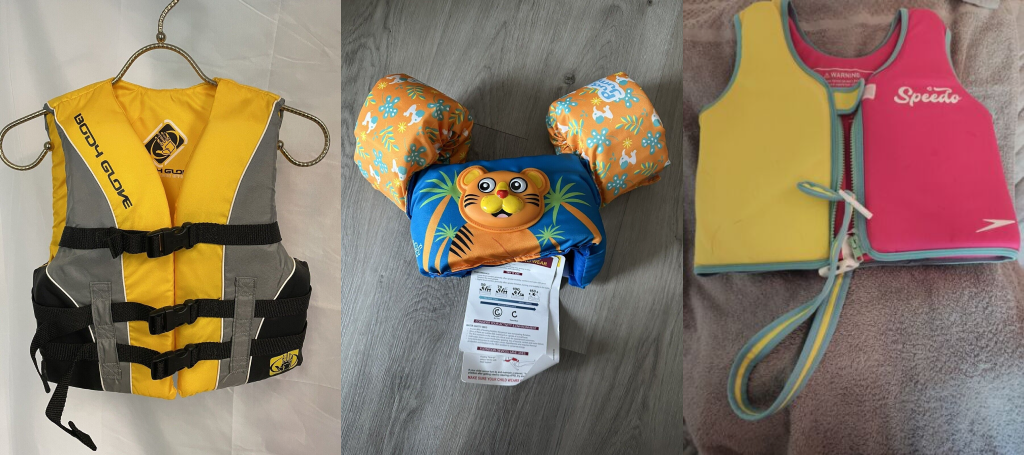
As a dad who’s all about ensuring my kids are safe in the water (while still keeping the fun alive), I can’t stress the importance of personal flotation devices for our little ones enough. Let’s dive into the world of personal flotation devices designed for toddlers and understand how they can boost your child’s confidence and safety in the water.
Life Jackets: Your Toddler’s Water-Wear BFF
- Types of Life Jackets: There are several life jackets, but for our kiddos, the most important ones are Type II and Type III. Type II is designed for calm waters and provides more buoyancy. In contrast, this Type III life jacket
 , sold on Amazon, offers more freedom of movement and is great for pool play.
, sold on Amazon, offers more freedom of movement and is great for pool play. - Proper Fit and Sizing: Getting the right fit for your child’s life jacket is crucial. A snug fit ensures they won’t slip out of it, and the jacket won’t ride up. Check the weight recommendations and try it on your little one before heading to the water.
Puddle Jumpers: The Perfect Combo of Safety and Fun
Puddle jumpers are a popular flotation device for toddlers that combines a life jacket’s security with the freedom of arm floats. They’re perfect for little ones learning to swim or just wanting to splash around in the pool. For the backyard pool, I prefer to use this type of puddle jumper (see example here ). I love how they gives my kids the confidence to explore the water while keeping them safe.
). I love how they gives my kids the confidence to explore the water while keeping them safe.
Swim Vests: Helping Your Child Stay Afloat
Swim vests are another excellent option for our tiny swimmers. They provide additional buoyancy and help kids maintain an upright position in the water. They’re great for introducing your child to swimming lessons or just for some extra support during pool playtime.
Let’s combine safety and fun with swim aids and pool toys to keep your child engaged and secure in the water.
Swim Aids and Pool Toys for Little Swimmers
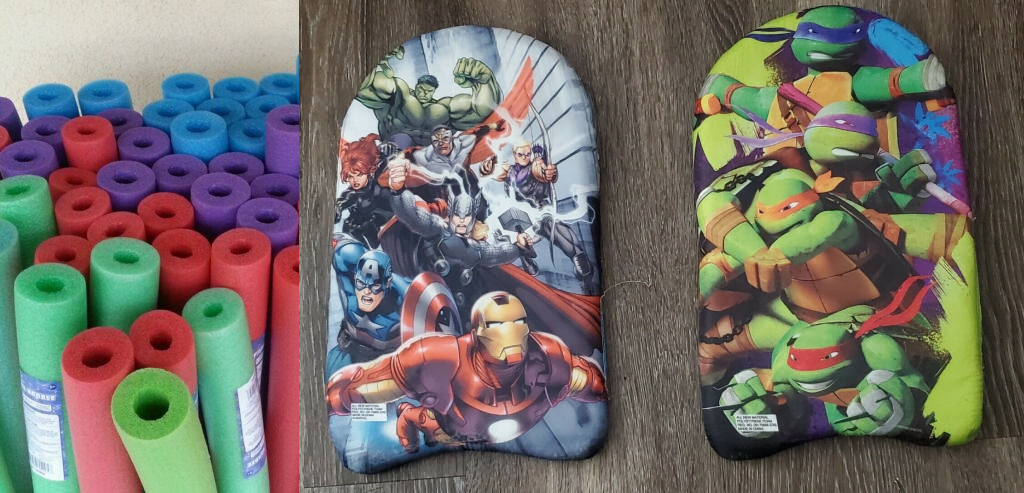
Uncover the best swim aids and pool toys that bring joy to your children’s pool time and promote safety and skill development. Let’s find the right swim-aids and pool toys for our little water bugs.
Swim Noodles: The Ultimate Pool Buddy
Swim noodles are not just a blast to play with but also support our little swimmers. They’re great for kids learning to float or just needing a little extra buoyancy. Remember, swim noodles are no substitute for proper supervision or flotation devices.
Kickboards: Kicking It Up a Notch
Kickboards are fantastic for helping our kiddos work on their swimming skills. They provide stability and support, allowing our young ones to focus on perfecting their technique.
Inflatable Arm Bands: Float Like a Butterfly
Inflatable arm bands, often called “water wings,” can give our toddlers some added confidence in the water. They help kids stay afloat while they learn to paddle. But always keep an eye on them – arm bands can slip off or deflate. It happened to my daughter when she did her first jump into the pool. Good thing I was on the deck, and I could react quickly.
Floating Pool Toys: Supervised Play for the Win
Floating pool toys like noodles or inflatable rings are perfect for supervised playtime. They can even encourage kids to practice their swimming skills. However, they are not safety equipment. In fact, they can become dangerous, as they can block your ability to watch over the pool. With too many of these floating around the pool during a pool party, you could easily miss the one kid under the water.
Just make sure you’re always there, keeping a watchful eye on your precious swimmers. Finally, let’s ensure our kids become responsible swimmers by teaching them the essential pool safety rules through pool safety education.
The ABCs of Pool Safety Education for Kids
Alright, my fellow pool-loving parents, let’s talk about the secret ingredient to a fantastic and safe pool experience: pool safety education! Trust me, as a dad who’s always trying to find the perfect balance between safety and fun, I can’t emphasize enough how important it is to educate our little ones about pool safety.
Swimming Lessons: Making a Splash the Right Way
- Swimming lessons are the foundation of pool safety. The sooner our kids learn to swim, the more confident and secure they’ll be in the water. Plus, they’ll have a blast learning new skills!
- Teaching Pool Safety Rules: No running, no diving, no roughhousing – you know, the drill. Teaching our kids the essential pool safety rules is crucial. Make it fun by turning it into a game or a catchy song.
- Emergency Response Training: As parents, we hope we’ll never have to face a pool emergency, but it’s best to be prepared. Learn CPR, first aid, and water rescue techniques, and teach your kids age-appropriate emergency response skills. Trust me, it’s worth the peace of mind knowing we’re ready for whatever comes our way.
Pool safety education is a game-changer that complements all those safety devices we’ve lined up for our toddlers. By empowering our kids with knowledge and skills, we’re creating a safer and more enjoyable pool experience for everyone. So, let’s get our little fishies enrolled in a class to kickstart their swimming journey.
Conclusion
I hope you feel more confident about keeping your little ones safe during those splish-splash moments. As a dad who’s been there, let me tell you that selecting the right safety devices is crucial. Trust me, you don’t want to regret not securing your pool.
On the other hand, even with all these fantastic safety devices in place, there’s no substitute for good ol’ parental supervision. Therefore, combining the right safety devices with proper supervision and swimming lessons can create a safe pool environment for our toddlers.
And with that, my friends, I wish you and your family a fantastic, fun-filled, and safe pool season.
Stay vigilant whenever your little one is in or around the pool.
P.S. Want to know which pool alarm is most suitable for you and your swimming area? Check out this list of the best pool alarms. It will help you know exactly which one to pick!
Whether you’re looking to add a pool alarm system to an inground pool, an above-ground pool, or even a spa, this guide contains the safest pool alarms.

